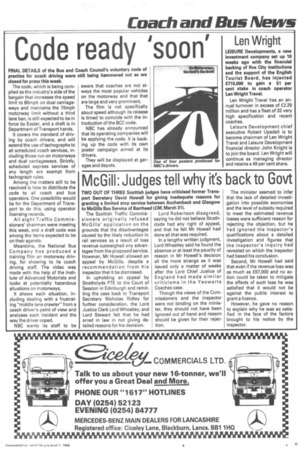McGill: Judges tell why it's back to Govt
Page 21

If you've noticed an error in this article please click here to report it so we can fix it.
TWO OUT OF THREE Scottish judges have criticised former Trans.. port Secretary David Howell for giving inadequate reasons for granting a limited stop service between Auchenback and Glasgow to McGills Bus Service of Barrhead (CM, March 31).
The Scottish Traffic Commissioners originally refused McGills' application on the grounds that the disadvantages caused by the likely reduction in rail services as a result of loss revenue outweighed any advantages from the proposed service. However, Mr Howell allowed an appeal by McGills, despite a recommendation from his inspector that it be dismissed.
In upholding an appeal by Strathclyde PTE to the Court of Session in Edinburgh and remitting the case back to Transport Secretary Nicholas Ridley for further consideration, the Lord Justice Clerk Lord Wheatley, and Lord Stewart felt that he had erred in law in not giving detailed reasons for his decision. Lord Robertson disagreed, saying he did not believe Strathclyde had any right of appeal, and that he felt Mr Howell had done all that was required.
In a lengthy written judgment, Lord Wheatley said he found the absence or at least the paucity of reason in Mr Howell's decision all the more strange as it was issued only a matter of weeks after the Lord Chief Justice of England had made similar criticisms in the Yeowarts Coaches case.
Though the views of the Commissioners and the inspector were not binding on the minister, they should not have been ignored out of hand and reason should be given for their rejection. The minister seemed to infer that the lack of detailed investigation into possible economies and the level of subsidy required to meet the estimated revenue losses were sufficient reason for rejecting the objection, but he had ignored the inspector's qualifications about a detailed investigation and figures that the inspector's inquiry had revealed on which the inspector had based his conclusion.
Second, Mr Howell had said that even if the revenue loss was as much as £67,000 and no action could be taken to mitigate the effects of such loss he was satisfied that it would not be against the public interest to grant a licence.
However, he gave no reason to explain why he was so satisfied in the face of the factors brought to his notice by the inspector.




































































































